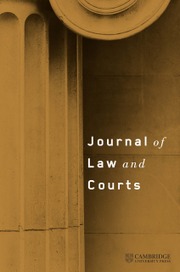Article contents
Measuring Subjective Ideological Disagreement with the US Supreme Court
Published online by Cambridge University Press: 21 October 2022
Abstract
Conventional wisdom suggests that judicial legitimacy should be relatively unaffected by satisfaction with the ideological direction of judicial policy making. Recent studies challenge this assertion. The key to resolving this conundrum is estimating individual-level satisfaction with the ideological direction of judicial policy making reliably and validly. We examine the accuracy of several common measures of the concept. We find that 40% of the respondents repudiate their own scores on these measures. With this much systematic measurement error in such an important independent variable, the question of whether the Supreme Court’s institutional legitimacy is conditional on ideological agreement with its decisions must be reexamined.
- Type
- Research Article
- Information
- Copyright
- © 2020 by Law and Courts Organized Section of the American Political Science Association. All rights reserved.
Footnotes
We greatly appreciate the support of Steve Smith and the Weidenbaum Center for this research. This project was made possible by a grant from TESS: Time-Sharing Experiments for the Social Sciences (NSF grant 0818839), Jeremy Freese and James Druckman principal investigators, to whom we are much indebted. We also acknowledge the assistance of Patrick Tucker in preparing the data we use for analysis, and we appreciate the comments of Pamela Corley, Chris Fariss, Charles Crabtree, Deborah Beim, Markus Neumann, Jeffrey Ziegler, and Miguel Maria Pereira on an earlier version of portions of this analysis. James L. Gibson is a Fellow at the Centre for Comparative and International Politics and holds the position of Professor Extraordinary in Political Science at Stellenbosch University (South Africa).
References
- 11
- Cited by


